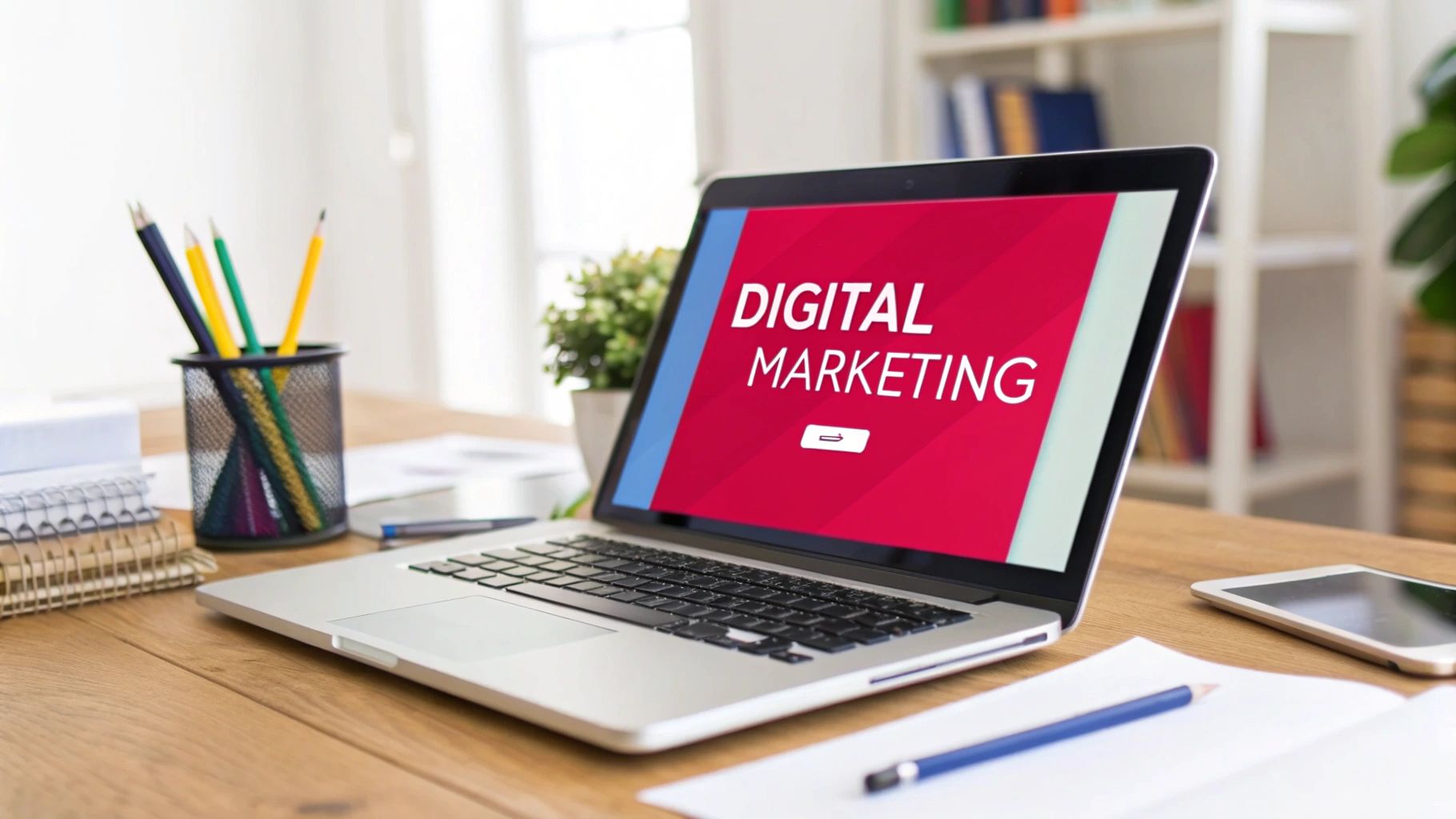Think of a digital marketing service as a dedicated growth partner for your business. Their job is to use online channels to get your name out there, connect with customers, and bring in new leads. It’s like hiring an expert crew to design, build, and maintain your company’s entire online presence, from your website to your social media feeds.
What Is a Digital Marketing Service Really

Many business owners see marketing as just another line item on the budget. But a real digital marketing service isn't an expense—it's an investment in a purpose-built growth engine. You're not just paying for a list of tasks; you're buying into deep expertise, sophisticated tools, and a unified strategy that most companies simply can't build on their own.
This isn't about just posting on social media once in a while or sending out a monthly newsletter. It’s about creating a cohesive system where every single piece works together to hit clear, measurable business goals.
The Strategic Partnership Model
A huge part of what a digital marketing service does is master effective inbound lead generation strategies. Instead of shouting at potential customers with ads, the aim is to draw them in by offering real value and building trust over time. It’s the difference between a random billboard on the highway and a helpful expert personally guiding a customer to the exact solution they need.
This partnership approach means the agency becomes a true extension of your own team. They take the time to get to know your goals inside and out and then turn them into campaigns that actually work online, leaving you free to focus on what you do best: running your business.
At its heart, a digital marketing service provides the strategic framework, technical execution, and analytical insight needed to connect with modern customers where they spend their time—online.
Pillars of a Modern Digital Strategy
To build a strong and consistent brand presence, these services lean on a few key pillars that all support one another. While there are countless tactics out there, nearly every successful strategy is built on the same core foundations. Our complete overview of the https://grassrootscreativeagency.com/services-for-digital-marketing/ shows how these pieces fit together to drive real results.
These foundational pillars usually include:
- Search Engine Optimization (SEO): This is all about making sure your business shows up when people search on Google for the products or services you provide.
- Social Media Marketing: It's more than just posting; it's about building a community, talking with your audience, and creating loyal fans on platforms like Instagram and LinkedIn.
- Paid Advertising (PPC): Think of this as a direct line to your ideal customer. Targeted ads let you reach specific groups of people to generate traffic and leads almost instantly.
- Content Creation: This means creating genuinely useful articles, videos, and graphics that position you as an authority and attract the right kind of attention.
The magic of a great digital marketing service is its ability to weave these pillars into a single, powerful strategy. This synergy is fueled by advanced software and data. The Middle East digital marketing software market was valued at USD 3.893 billion in 2024 and is expected to hit USD 12.391 billion by 2033, which highlights just how much this industry is leaning on data-driven approaches. This investment in technology is what allows agencies to create highly targeted campaigns, automate routine work, and ultimately deliver a much better return on investment.
The Core Components of a Growth Engine
A great digital marketing service doesn't just tick boxes on a to-do list; it builds and runs a genuine growth engine for your business. Think of it like a high-performance car engine. Every part—the pistons, spark plugs, and fuel injectors—has to work in perfect harmony. If even one piece is off, the whole engine starts to sputter.
That's how digital marketing channels work, too. They aren't separate islands. They’re interconnected parts that, when put together correctly, build momentum, pull in traffic, and generate revenue far more effectively than any one of them could on its own.
Let's pop the hood and look at the essential parts of this engine.
Search Engine Optimisation: The Foundation
Search Engine Optimisation (SEO) is the bedrock of your online presence. Imagine your website is a new retail store. SEO is what gets you a spot on the busiest street in town, where thousands of potential customers walk by every single day. Without it, you're stuck in a quiet back alley where no one can find you.
At its core, SEO makes sure that when someone searches on Google for a product or service you offer, your business shows up right at the top. This isn't about gaming the system. It's about making your website as genuinely helpful and easy to use as possible—for both search engines and actual people.
This infographic gives you a snapshot of how different SEO strategies work together to drive more traffic.
As you can see, you need a smart mix of on-page, off-page, and technical SEO to get the best results and really own your spot in search results.
Content Marketing: The Fuel for Engagement
If SEO gives you the prime location, content marketing is the expert advice and amazing service you provide inside your store that builds trust and keeps people coming back. It’s the fuel for your engine. This means creating blog posts, videos, how-to guides, and infographics that actually answer your audience’s questions and solve their problems.
Great content does two things really well:
- It attracts the right people: By creating content about things your ideal customers actually care about, you naturally pull them toward your website.
- It builds your authority: When you consistently share useful information, you become a go-to expert in your field. This makes customers far more likely to choose you over a competitor.
Take a local accounting firm, for example. They could write articles on "Tax Tips for Small Businesses in the UAE." This content doesn't just attract local entrepreneurs searching for help; it also positions the firm as a trusted expert they can rely on.
Social Media and Paid Advertising: The Accelerator
Social Media Marketing and Pay-Per-Click (PPC) advertising are the accelerators for your growth engine. While SEO and content build momentum over the long haul, these channels give you an immediate shot of visibility and traffic. They let you get in front of very specific groups of people, right now.
Think of social media as your business’s community hangout. It's where you have real conversations, share what you’re up to, and build a loyal following on platforms like Instagram, LinkedIn, and Facebook.
PPC, on the other hand, is like placing a perfectly timed ad right in front of your ideal customer the moment they're looking for what you sell. An e-commerce store with hiking gear, for instance, can use Instagram ads to target users who follow outdoor adventure pages, turning a casual scroll into a sale. To get this right, you first need a powerful ecommerce digital marketing strategy.
The investment here is huge and growing fast. Digital ad spending in the GCC hit around $5.5 billion in 2022 and is set to climb even higher. This boom is fueled by sky-high internet usage and a young, tech-savvy population, proving that paid ads are a central part of modern marketing, not just an add-on.
Email Marketing: The Customer Relationship Builder
Finally, email marketing is what keeps relationships strong and drives repeat business. It's the most direct and personal way to communicate with your audience. Once someone signs up for your list, you can send them personalized content, special offers, and useful updates right to their inbox.
Email marketing is your engine's maintenance system. It keeps your audience engaged, builds long-term loyalty, and converts one-time buyers into lifelong brand advocates.
An online course provider might use email to send a welcome series to new subscribers, share free tips to build trust, and eventually announce a new course. This steady, valuable communication keeps the brand top-of-mind and strengthens the customer bond over time, making sure your growth engine runs smoothly for years.
Overview of Core Digital Marketing Channels
To help tie all this together, the table below breaks down each core channel. It shows you what each one is for, how success is measured, and where it fits best.
| Channel | Primary Goal | Key Performance Indicators (KPIs) | Best For |
|---|---|---|---|
| SEO | Increase organic visibility and attract qualified traffic. | Keyword rankings, organic traffic, backlink quality. | Building a long-term, sustainable source of leads and sales. |
| Content Marketing | Build authority, engage an audience, and support SEO. | Engagement rate, time on page, lead generation. | Businesses in expertise-driven industries (B2B, tech, finance). |
| Social Media | Build community, increase brand awareness, and drive engagement. | Follower growth, engagement rate, social shares. | Brands targeting specific demographics and building a community. |
| Paid Ads (PPC) | Generate immediate traffic, leads, and sales. | Click-Through Rate (CTR), Conversion Rate, Return on Ad Spend (ROAS). | E-commerce, lead generation campaigns, and product launches. |
| Email Marketing | Nurture leads, drive repeat business, and build customer loyalty. | Open rate, click-through rate, conversion rate. | Businesses with a defined customer list, especially e-commerce. |
Each of these channels plays a unique and critical role. The real magic happens not when you use one, but when you integrate them into a single, cohesive strategy that powers your business forward.
What This Actually Means for Your Business

Knowing what goes into a digital marketing service is one thing, but what you really care about is how it translates into real-world results. This is where the theory stops and the tangible outcomes—more customers, higher revenue, and a stronger brand—begin.
The right partnership shifts marketing from a line item on your expense sheet to a reliable engine for growth. You're not just buying social media posts or email campaigns. You're investing in a steady stream of qualified leads, better conversion rates, and a return on investment (ROI) you can actually measure. These are the numbers that matter.
Building Unshakeable Brand Authority
In a noisy market, just showing up isn't enough. You have to be seen as an authority, the go-to resource in your field. A professional digital marketing service builds this credibility layer by layer through smart content, consistent community engagement, and glowing online reviews.
Think of a B2B software company trying to cut through the noise. By regularly publishing insightful articles and detailed case studies, they do more than just attract potential clients; they earn a reputation for genuine expertise. Soon enough, when a prospect needs a solution, that company is the first one that comes to mind. That trust makes the entire sales process a whole lot smoother.
This authority is what turns casual visitors into loyal fans and advocates for your brand. It's a long-term asset that keeps paying you back for years.
Creating a Predictable Flow of Qualified Leads
One of the biggest wins is breaking free from the stressful "feast or famine" cycle that plagues so many businesses. A well-oiled digital strategy creates a dependable system for attracting people who are genuinely interested in what you have to offer. This is where a digital marketing service truly shines.
For example, a specialized B2B firm we worked with was struggling to get consistent demo requests. By rolling out a targeted content program paired with strategic LinkedIn ads, they managed to triple their qualified demo requests in just six months.
This wasn't a fluke. It was the direct result of a system built to:
- Attract the Right People: Using SEO and paid ads to connect with decision-makers who were actively looking for what they offered.
- Nurture Genuine Interest: Providing valuable content that educated prospects and built a foundation of trust.
- Convert Warm Leads: Using clear, compelling calls-to-action that made booking a demo a no-brainer.
This methodical approach delivers the predictability you need to scale your business with confidence. If you're just starting to figure this out, we've put together a guide on digital marketing for small business to help you build that solid foundation.
Accessing Top-Tier Talent and Technology
Let's be realistic: hiring a full in-house marketing team—an SEO expert, a content writer, a social media manager, and a paid ads specialist—is incredibly expensive. On top of the salaries, you'd also have to shell out for a whole suite of premium marketing tools for analytics, automation, and design.
Partnering with an agency gives you immediate access to a full team of specialists and their entire technology stack for a fraction of the cost of building it yourself.
This is a massive advantage that often gets overlooked. You get to skip the steep learning curves and high overheads, putting you in a position to compete with much larger companies without needing their budget.
This kind of efficiency is vital. The digital advertising market in the Middle East and Africa, for instance, was valued at around USD 31.99 billion in 2024 and is on a steep growth trajectory. This boom is fueled by mobile-first habits and advanced tech, making expert guidance more crucial than ever.
How to Measure Marketing That Actually Works
For a lot of business owners, marketing feels like a black box. You put money in, but it’s tough to see what, if anything, comes out the other side. That uncertainty makes it hard to invest with confidence. A good digital marketing service completely changes that dynamic by zeroing in on clear, measurable results that tie directly to your bottom line.
Forget fuzzy concepts. Smart marketing is all about the data. The right partner won't just send you reports on what happened last month; they’ll use those analytics to constantly tweak and improve what happens next. This approach transforms marketing from a mysterious expense into a predictable engine for growth. It all comes down to answering one simple question: "Is this working?"
The story of your marketing performance is told through data. A great agency doesn't just show you the numbers; they explain what they mean, turning complex analytics into a clear roadmap for growth.
Truly understanding how to measure advertising effectiveness is what separates successful campaigns from wasted budgets. It’s about cutting through the noise and focusing on the key performance indicators (KPIs) that actually move the needle for your business.
From Vague Metrics to Actionable Insights
It’s easy to get caught up in "vanity metrics" like likes or impressions. They look nice on a report, but they don't pay the bills. A results-focused digital marketing service will steer you toward the numbers that reflect real business growth, turning surface-level data into insights you can act on.
Here are a few of the core metrics a professional partner will obsess over:
- Customer Acquisition Cost (CAC): Simply put, how much does it cost you to land a new customer? A falling CAC is a sign your marketing is getting more efficient.
- Customer Lifetime Value (LTV): This is the total amount of money a customer is likely to spend with your business over their entire relationship with you.
- Return on Ad Spend (ROAS): For every pound you put into an ad campaign, how many pounds do you get back in sales? This KPI gets straight to the point.
Focusing on these numbers changes the conversation from "How many people saw our ad?" to "How much revenue did our ad generate?" That’s the bedrock of a partnership where marketing is held accountable for real results.
Understanding the CAC to LTV Ratio
One of the most powerful indicators of your marketing's health is the ratio between your Customer Acquisition Cost (CAC) and your Customer Lifetime Value (LTV). It’s a straightforward way to see if your marketing spend is sustainable.
Think of it this way: if it costs you £100 to bring in a new customer (your CAC), but that customer goes on to spend an average of £500 with you (your LTV), you've got a healthy 5:1 ratio. For every £1 you invested to get them, you've made £5 back. A strong LTV to CAC ratio is the ultimate proof that your marketing isn’t just working—it’s profitably growing your business.
The Power of Continuous Optimization
The real magic of a great agency isn't just in launching campaigns; it's in their relentless drive to optimize them. They use the data from these key metrics to make smarter decisions, week after week.
If one ad campaign is delivering a fantastic ROAS, they'll put more money behind it. If a certain channel is bringing in customers with a low CAC, they’ll double down on that channel. This constant cycle of measuring, analyzing, and adjusting is what turns marketing from a guessing game into a reliable growth strategy. It gives you the confidence to know every decision is backed by cold, hard data, all aimed at one goal: growing your business.
How to Choose the Right Marketing Partner
Picking a digital marketing agency is one of the biggest decisions you’ll make for your business. This isn’t like hiring a vendor; it’s more like bringing on a new business partner—one who will have a direct hand in your brand's reputation, your ability to generate leads, and, ultimately, your bottom line.
Get it right, and you’ll see incredible growth. Get it wrong, and you’re looking at a wasted budget and a lot of missed opportunities. The key is to have a clear, methodical way to vet potential partners, moving past the slick sales pitches to see what really matters: their track record, how they communicate, and whether they truly get your industry.
Look Beyond the Portfolio
Every agency is going to show you their highlight reel. That's a given. But your job is to dig deeper. A gorgeous website or a viral social media post is great, but it's just window dressing if it didn't actually move the needle for the client.
When you’re looking at case studies, don’t just look at what they did. Ask why they did it and, more importantly, what happened next.
You’re looking for hard proof of success—real numbers that connect their work to business outcomes.
- Did their SEO strategy lead to a 40% increase in organic traffic for a client?
- Did that flashy paid ad campaign actually deliver a 5:1 Return on Ad Spend (ROAS)?
- Can they draw a straight line from their content strategy to a doubling of qualified leads?
Vague claims like “boosted engagement” just don’t cut it. You need to see tangible evidence that they know how to turn marketing activities into genuine business growth. That’s the mark of a results-driven agency.
Ask the Tough Questions
Those first few conversations are your golden opportunity to see how an agency really thinks. Come prepared with a list of questions that cut right to the chase. You're not just trying to understand their promises; you're trying to understand their process.
Here are a few questions you should absolutely ask any potential partner:
- Walk me through a campaign you’re proud of. What was the strategy, and why did you make those specific decisions? This question pulls back the curtain on their strategic thinking.
- What’s your plan if we don’t see the results we expect in the first 90 days? Their answer reveals how agile and data-driven they truly are.
- For our specific business goals, what metrics will you be tracking to measure success? This makes sure you're both on the same page from day one.
- Can you describe your process for communication and reporting? Look for a clear commitment to regular, transparent updates. You shouldn’t have to chase them for information.
A confident, capable agency will welcome these kinds of questions. They’ll have thoughtful, clear answers that show off their expertise and make you feel confident in their ability to deliver.
Evaluate Their Communication and Culture
Technical skills are obviously important, but a great partnership really comes down to chemistry. You'll be working closely with this team, so a good cultural fit and seamless communication are non-negotiable.
A great marketing partner feels like an extension of your own team. They're collaborative, transparent, and genuinely invested in your success. It should feel like a shared mission, not a transaction.
This collaborative spirit is everything. As we've said before, choosing the right creative partner makes all the difference because it builds a foundation of trust. That trust is what will get you through challenges and help you achieve those big, long-term goals together.
Agency Evaluation Checklist
To help you stay organized during your search, use this checklist. It provides a structured way to compare different agencies and ensure you're not missing any critical details.
| Evaluation Criteria | What to Look For | Red Flags to Avoid |
|---|---|---|
| Proven Results | Specific, data-backed case studies with clear ROI. Hard numbers, not just vanity metrics. | Vague claims like "increased brand awareness." A portfolio with no measurable outcomes. |
| Strategic Approach | A clear process for understanding your business and building a custom strategy. | A "one-size-fits-all" package or cookie-cutter solutions. |
| Communication Style | Proactive updates, clear reporting dashboards, and a designated point of contact. | Slow response times. Having to chase them for information or reports. |
| Industry Expertise | Experience working with businesses in your niche or with similar challenges. | A purely generalist approach with no specialized knowledge. |
| Transparency | Clear pricing, detailed proposals, and open discussions about what's working (and what's not). | Hidden fees, confusing contracts, or an unwillingness to discuss poor results. |
| Client References | Eagerness to connect you with current or past clients who can vouch for their work. | Hesitation or outright refusal to provide references. |
By systematically running each potential partner through this checklist, you can move beyond gut feelings and make a decision based on concrete evidence.
Watch Out for Red Flags
Finally, knowing what to avoid is just as important as knowing what to look for. Some things should set off alarm bells immediately. A truly professional agency won't rely on empty promises or pushy sales tactics.
Be cautious of any agency that:
- Guarantees #1 Rankings on Google: Anyone who knows SEO understands this is an impossible and unethical promise to make.
- Lacks Transparent Reporting: If they can't show you exactly how they're measuring performance and ROI, they're probably hiding something.
- Uses a One-Size-Fits-All Approach: Your business is unique. Your marketing strategy should be, too.
- Is Reluctant to Share Client References: A history of happy clients is an agency's best sales tool. If they won't share references, it’s a major warning sign.
Choosing your marketing partner is a strategic investment in your company’s future. If you do your homework, ask the tough questions, and trust your gut, you’ll find a team that’s more than just a service provider—they'll be a true ally in helping you hit your most ambitious goals.
Got Questions About Digital Marketing Services? We've Got Answers.

Jumping into the world of professional digital marketing is a big step. It’s totally normal to have questions about the practical side of things—like costs, timelines, and whether you should hire out or build your own team. Getting clear, honest answers is the only way to feel confident you're making the right move for your business.
Let’s walk through a few of the most common questions we hear from business owners before they decide to invest in a digital marketing service. This should help set the right expectations and point you toward the path that makes the most sense for where you want to go.
How Much Should We Actually Budget for Marketing?
This is the million-dollar question, isn't it? The truth is, there's no magic number that works for everyone. Your ideal budget really depends on your industry, what you’re trying to accomplish, and how fast you want to get there.
That said, most businesses find a sweet spot, dedicating somewhere between 5% and 15% of their total revenue to their marketing efforts.
Where you fall in that range depends on a few key things:
- Your Business Stage: A brand-new startup trying to make a name for itself will naturally need to invest more upfront than a well-known company with a built-in audience.
- How Tough Your Market Is: If you're in a crowded space, you'll likely need a bigger budget for things like paid ads and a more aggressive SEO plan just to cut through the noise.
- Your Growth Ambitions: Are you aiming for steady, predictable growth? Or are you trying to double your leads in the next year? Bigger goals require a bigger investment to make them happen.
How Long Until I See a Return on My Investment?
Patience is probably the most underrated part of a great marketing strategy. The time it takes to see a real return on investment (ROI) can vary wildly depending on which channels you’re using. Understanding this from the get-go is key to avoiding frustration.
Think of it like planting a garden. Some seeds, like paid ads, can sprout almost overnight. Others, like SEO, are more like planting an oak tree—it takes time to grow, but it provides incredible value for years and years to come.
Here's a rough idea of what to expect:
- Pay-Per-Click (PPC) Advertising: You can see traffic and leads rolling in within the first few days or weeks. Fine-tuning your campaigns to be truly profitable, however, usually takes a good one to three months.
- Search Engine Optimization (SEO): This one is a marathon, not a sprint. You’re building a long-term asset. It generally takes six to twelve months to see significant, lasting results as you build authority and climb the search rankings.
- Content and Social Media Marketing: Building a real, engaged community that trusts you doesn't happen overnight. You can expect to see a direct ROI from these efforts after about three to six months of consistent, high-value work.
Should I Hire an Agency or Build an In-House Team?
This is a huge strategic decision, and the right answer depends entirely on your company's resources, expertise, and where you see yourself in the long run. There’s no single "best" choice, only the one that fits your business right now.
Building an In-House Team is a fantastic option when you need someone who lives and breathes your specific products and industry. It gives you maximum control and helps build a unified company culture. The downside? It comes with the high costs of salaries, benefits, and constant training—not to mention the headache of finding and retaining top-tier talent.
Hiring a Digital Marketing Agency instantly plugs you into a whole team of specialists—from SEO gurus to ad wizards—for a fraction of what it would cost to hire them all individually. This route offers a ton of flexibility and brings fresh perspectives from different industries, though it does take a little time for the agency to get fully up to speed on the nuances of your brand.
At Grassroots Creative Agency, we offer the specialized expertise of a full-service agency but with the dedicated focus of an in-house partner. We build data-driven strategies that get you measurable results. Discover how we can help your business grow.








